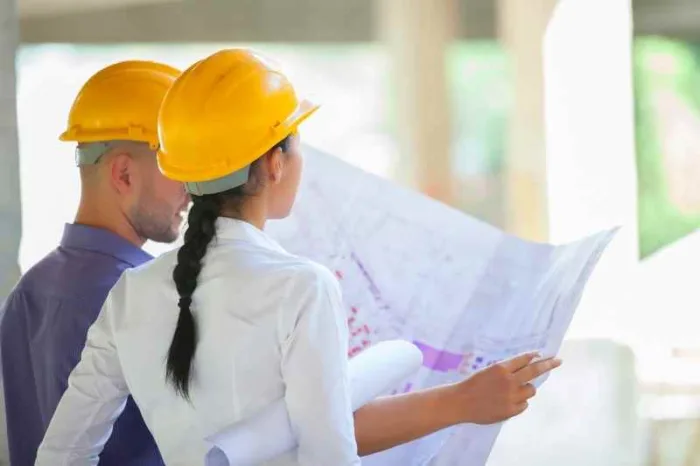
A successful construction business needs project managers who understand the ins and outs of real estate construction and development. But that’s not all. Project managers also need to understand workers’ needs and on-site challenges and requirements.
Being a construction project manager often means balancing two very different aspects of team leadership. In addition to practical knowledge and experience, construction manager skills involve a foundational understanding of people and social interactions.
In general, the soft skills of listening, communicating, and delegating are every bit as important as hard skills. Hard skills required include financial management, organization, and risk assessment. In a role with so many different responsibilities, there are many valuable skills and abilities to obtain.
Here are the top three skillsets that every construction project manager needs:
1. Leadership
Leadership in construction is a fundamental project manager skill that forms the basis of many others on this list.
To successfully lead a team through an entire project, a construction manager must:
- Give clear instructions
- Set specific goals
- Motivate people to cohesively work together
A successful construction manager thoroughly understands their team and each contributor’s individual strengths to coordinate an action plan accordingly. In the construction industry, there are constant setbacks and curveballs that require a strong leader to resolve and manage effectively.
Bad weather, delayed supply deliveries, and internal disputes are all common challenges for a construction project manager. So, tackling these challenges — and guiding a team successfully — requires good leadership strategies.
Within leadership, a construction project manager must also have the following abilities:
Delegation
Delegation is the art of assigning roles to individuals. On any given construction project, various tasks and roles require specific knowledge and skills. So, a good project manager needs to delegate those roles wisely.
For instance, if a construction employee has a particular knack for numbers, a good project manager will take note of this. In the future, they’ll assign them tasks involving measurement, budgeting, and scaling of construction products.
Or, if one team member has strong negotiation skills, the project manager can bring them to a difficult contract meeting.
Overall, a good construction project manager knows how to delegate tasks based on team members’ strengths. In turn, this will maximize the team’s collective productivity and end results.
Watch how ButterflyMX works:
Adaptability
In this unpredictable world, flexibility and adaptability are the driving forces behind progress. If a project manager can’t roll with the punches, leading a construction project will be needlessly stressful and exhaustive.
In addition, understanding that a project timeline will not always go to plan is an important quality in any leadership role. There are many external factors that could influence the outcome of a project, and that’s just how it is.
Ultimately, being adaptable to unforeseen changes enables the team to sustain momentum and push forward toward our goals. A strong construction project manager needs to be able to not only cope with sudden change but prepare for it from the very start.
Communication
Between clients, business partners, suppliers, outsourcers, contractors, and subcontractors, a construction project manager needs to harness excellent communication skills.
Ensuring that a professional construction project is executed smoothly requires collaboration from all contributing parties. But the project manager is typically responsible for the lines of communication between them.
From the administrative workers securing all the right paperwork to the on-site job personnel — and everyone in between — the project manager must stay informed of each step. And they need to clearly communicate the project updates and status from start to finish.

2. Industry experience
Even the best project managers in the world might struggle in the construction industry. The constantly evolving nature of the construction industry creates unique situations and factors that can only be learned through first-hand experiences.
The more experience a construction project manager has, the easier it will be for them to take on innovative, accurate strategies for approaching projects.
The construction industry is dynamic, with new material and technological developments happening on a regular basis. So, having prior industry knowledge and experience makes a project manager better equipped to make more sound business decisions for both their employees and the company.
These are the specific construction knowledge and skills that an experienced project manager must have:
Risk assessment
It’s no secret that there are a huge number of risks involved in construction management. And the construction industry itself can be physically dangerous for employees.
For instance, there were 174,100 cases of injuries on construction sites in 2020 alone. All construction managers need to have a strong grip on how to best protect their team from avoidable harm.
What’s more, leadership in construction means being able to draw up a risk analysis report for each project. It requires carefully weighing out potential risks and examining how those risks may impact the outcome of the project.
Most importantly, construction risk assessments involve taking the safest possible route to success. Once the potential risks are evaluated, a good construction project manager will do whatever they can to mitigate them.
The three most important considerations in risk assessments are:
- All safety protocols are met
- Required safety gears and tools are available
- Everyone on site follows the rules and safety protocols
Negotiation
A construction project manager must have superb negotiation skills to appropriately allocate budgets and meet stakeholders’ expectations. When necessary, they also need to swiftly make changes that keep the project on the right path.
Negotiating requires good social skills and the ability to communicate clearly with others, even when a conflict arises. Specifically, knowing how to manage expectations and handle opposing perspectives allows project managers to resolve conflicts and best support their teams.
Financial expertise
In addition to the many organizational and practical industry skills, a construction project manager must also have financial knowledge and expertise. First and foremost, a construction project needs a budget, which a project manager is responsible for creating.
Typically, construction projects are expensive and require thorough financial and budget analysis before any physical work can begin. As such, developing a budget requires rationality, industry experience, and financial planning skills.
To create a comprehensive construction project budget, consider the following:
- Total costs of all essential materials
- Number of workers needed
- A good sense of the project’s profitability
To successfully plan and execute a construction project, managers must have a thorough understanding of its financial requirements. Also having financial literacy provides deeper insight into the administrative side of managing a construction team.
3. Goal setting
When setting goals, there is an emphasis on outcomes and project execution. Project manager skills must include a strong ability to set and pursue goals with consistent energy and focus.
The ability to set both long- and short-term goals enable a project manager to see things more clearly. It also allows them to tackle each part of the process with equal enthusiasm.
Once a target has been drawn, hitting it in the center becomes so much more achievable. A team will look up to their manager for guidance and motivation to move forward. Thus, goal setting is such an important aspect of leadership in construction.
To effectively set goals and communicate them to the team, a constructor manager must have these qualities:
Organization
Project managers of all types are essentially professional organizers. It falls under the responsibility of a construction manager to plan out schedules and stay on top of all changes, updates, and progressions in a project.
Undoubtedly, great organizational skills are the glue that holds any project together. Any construction project manager with natural organizational instincts will be able to oversee projects with improved efficiency.
Being able to multitask and manage numerous things at once is a quintessential project manager skill. Whether within the construction industry or otherwise. Having this skill means the tasks can be executed with greater speed, efficiency, and accuracy.

Decisiveness
Project management requires a great deal of decision-making. In order to do so, a construction project manager needs to have a strong grip on their own mind to develop a solid vision of the outcome of their assigned project.
Being decisive means exercising authority in moments of confusion, and having the right instincts to know what is best when tough choices need to be made.
An assertive, decisive project manager will make much faster, more informed decisions about how to move forward and meet expectations with greater ease. Construction managers can also use their assertive decision-making skills to help others understand the reasoning behind any major changes.
Openness to feedback
All great leaders must accept constructive criticism without becoming defensive. Nobody is perfect. Even the most experienced project managers need to remain open to feedback when others have something to say.
Being open to feedback allows others to feel more comfortable and creates a better space for honest dialogue to take place. Feedback sessions present an opportunity for construction project managers to strengthen their relationships with their teams.
It’s hard to respect a leader when they refuse to acknowledge the opinions and views of those around them. Any great leader can be defined by their treatment of others. As such, construction project managers should be held to the same standard.
The bottom line
When it comes to this dynamic role, there are a number of construction project management skills required to get the job done well.
However, with enough experience and dedication to the role, anyone can develop the leadership skills required for being a great construction project manager. Behind every well-completed construction project is a skilled project manager who weaves together superb leadership skills, rich industry experiences, and adept goal-setting abilities.

Author’s Bio:
Rae Oliver is a freelance author that covers a vast range of topics, from SaaS to lifestyle and fitness. Like many other 20-something professional digital nomads, she has a passion for travel, social media, and digital marketing.






